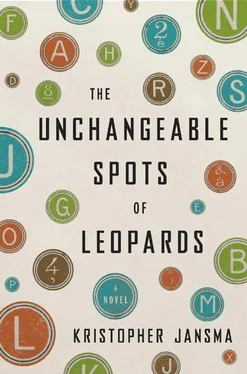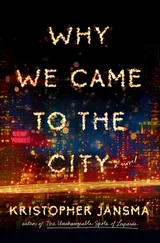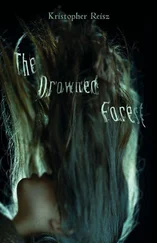She sits back. “No. I have to stay focused.”
And that is that. Alone together, we are worse than worthless.
Amy comes by with our bill, still terrified I think, that Julian is going to sic the managers on her, though she’s done nothing wrong. The little faux-leather booklet lies between Evelyn and me for a long, cold moment. Ordinarily Julian pays. I reach for my wallet, which we both know is empty. She reaches for her purse.
“My treat,” she says. “To celebrate. For the story.” She drops two hundreds on the table as if it were nothing. For her, it is.
It is, in fact, more than I’ll be paid for the story.
“I’ll get it next time,” I lie. I’ll never get it. We both know it.
“See you next Sunday,” she says and kisses me gently on the forehead. Then she taps my bluebells with her finger and I’m left to listen to the end of “At Last,” alone.
I can’t go on, I think to myself, scraping Julian’s eggs off my shirt. I’ll go on.
Curly-haired Amy comes back with the change. I siphon off an overapologetic tip and slide it back to her. Her nose stud glints as her round face breaks into a smile. “Thanks so much.”
She thinks the money is mine and I don’t correct her. In fact, I tuck the ample remainder into my pocket and pour myself the last of the Champagne. As I do, I notice Evelyn hovering by the mirror at the exit, fixing her makeup. Or pretending to.
“So,” Amy says, beginning to clean up the eggs sans Benedict that Julian has splattered, “how do you know Mitchell King ?”
“Who, Mitch?” I say, fumbling a Savannah accent — I can only fake it now. “Oh, why… we went to school together down in North Carolina. Benedictine Academy. Go Cadets .”
Amy giggles and eyes the bluebells. “I like your little flowers.”
“Why, thank you kindly, miss. My name’s Simon,” I lie, extending a hand to hers. She grips it, ladylike, and I glance at the mirror before I ask her, “Would you like to come with me to the zoo this afternoon? Have you ever seen the leopards?”
“What truth? You see where truth is, and where untruth is, but I seem to have lost my sight and see nothing.”
— ANTON CHEKHOV, THE CHERRY ORCHARD
Note: The following is reprinted with permission from the Vicksburg Review.
— C.E.E-B.
Winter winds howled through Union Square and snow piled up in the night; there were no pathways, only the backs of benches and the tops of trash cans. Streetlights bent up like periscopes from beneath the tundra. The tree branches were limned with white, as were the fire escapes and all the little terra-cotta pots out on them. Each pot sheltered a lump of dead earth and the dry husk of plant life within it. From the window of Anton’s apartment, I sipped some of his golden.Zubrówka vodka and watched three figures crossing the park from different angles, heads bent and trudging slowly, carving lines that would not intersect.
Rose lay on an Oriental-blue divan by the fireplace, her hair still pinned up from her rehearsal of The Cherry Orchard earlier that day. The only finished copy of my manuscript lay beside her in a heavy yellow hatbox, which I’d borrowed from Anton as a means of transporting my pages to and from the public library each day. Every few moments, Rose pinched the corner of a new page with two fingers, as if it were a beloved photograph, and lifted it from the box. As she read she rubbed her thumb softly against her latest engagement ring. This one was either from His Royal Highness, Umberto, Prince of Greece and Denmark, or from Phillipos the Fifth, of the former Royal Italian House of Savoy. It got so hard to keep track, and I found it easiest to live with myself when I did not know who her suitors were.
Through the thin paper, an orange glow outlined the shadow of her fingers as they scanned beneath my lines. Her deep brown eyes flitted from side to side; her lips occasionally cracked into a smile that sent my heart thumping, or they crept down into a puzzled frown that twisted my guts until I forced myself to gaze out the window again, hoping she would hurry and deliver me from my misery.
Then the peaceful crackle of the electric fireplace was interrupted by deathly hacking from the neighboring bedroom. Anton hadn’t been well in weeks. He’d wake up at odd hours and bang around the apartment while Rose and I were entangled in my room across the hall. In the morning we’d find burned-down candles, handkerchiefs stained with phlegm and typewriter ink, and discarded containers of wonton soup like artifacts for us to puzzle over.
As Rose got to the last page, I looked out into the snowy darkness again. I could still see the immortal statue of General George Washington on his horse. Before its erection, the square had been a potter’s field and, according to the research I’d done for my novel, only the penniless had been buried there, and they’d hung criminals from the elms. Beneath all that snow and concrete and dead grass and damp earth lay the bodies of some twenty thousand nameless men and women — forgotten before they’d even died.
“Finished,” Rose said, laying the last page on the divan beside her and stretching out like a lioness, satisfied with the day’s kill.
“And?” I asked, reaching for the bottle of  to refill my glass. Each bottle was adorned with a little brown bison and contained a single yellow blade of bison grass from the primeval Białowie.za Forest. Technically illegal in the States, the spirit was Anton’s favorite reminder of his homeland.
to refill my glass. Each bottle was adorned with a little brown bison and contained a single yellow blade of bison grass from the primeval Białowie.za Forest. Technically illegal in the States, the spirit was Anton’s favorite reminder of his homeland.
“And you’re brilliant,” she purred. “It’s absolutely masterful.”
I came over next to her and set my glass down. “You’re not just saying that?”
“Would I lie?” she teased. Behind her dark eyes, folded up inside Rose’s imagination, my characters were still alive, just as I’d described them. She scraped her ring gently against the back of my arm; liquor pulsed in my veins. Her head slowly moved into the orbit of my own. I kept my eyes open so I could see the gentle shake that comes when she’s fighting herself and losing. And then an inhuman rasping sound burst forth from Anton’s room, shattering the moment and all subsequent moments.
The sound grew louder, and soon the door pushed open and Anton half collapsed into the room, his bathrobe opened and his eyes red as beets.
“I’m dying,” he announced.
“Anton, dear, you have the flu,” Rose said for the hundredth time that week. She got up to look after him. She’d been mothering him since long before I knew either of them, since they were thirteen and both sent to live a continent away from their families at St. Alban’s Preparatory School. Quickly I shuffled the remaining pages together and slipped them back into the hatbox before Anton could see them. “Do you want us to order you more wonton soup?”
“Damn the soup!” Anton bellowed, tossing a checkerboard sans pieces over the divan and against the window. “Damn all the soup!”
“He’s delirious,” Rose said, chasing after him to try to tie his robe together.
“Melodramatic, you mean,” I said, and we both knew it was more likely that he was drunk.
Anton seemed to be offended by this. “There isn’t a melodramatic bone in my body,” he coughed. “And you ought to know the difference.” He seemed eager to go on, but he erupted into another coughing fit that he covered only barely with his sleeve. When he pulled the sleeve away, we could both see that it was specked with blood.
Читать дальше

 to refill my glass. Each bottle was adorned with a little brown bison and contained a single yellow blade of bison grass from the primeval Białowie.za Forest. Technically illegal in the States, the spirit was Anton’s favorite reminder of his homeland.
to refill my glass. Each bottle was adorned with a little brown bison and contained a single yellow blade of bison grass from the primeval Białowie.za Forest. Technically illegal in the States, the spirit was Anton’s favorite reminder of his homeland.









